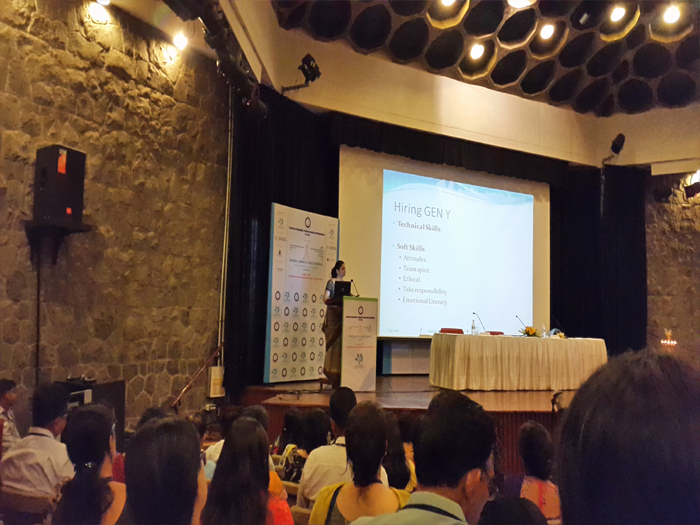National Summit of School Principals
Misconceptions about mental health issues are common. Often, even educated people talk about mental health concerns in very casual ways. Many believe that mental health difficulties mean a person is unstable, slow or even possibly has a character flaw.
As a result of these misconceptions, stigma is associated with mental health problems. Consequently, people are reluctant to accept the condition and get help for their problems.
About half of all serious mental health problems begin before the age of fourteen and to make matters worse, mental health problems in children are so complex that it is not easy to detect them. Research has shown that poor mental health leads to a plethora of other problems like low academic achievement, relationship-difficulties, high risk behaviours, violence, substance-abuse, poor reproductive and sexual health and even suicide. Apart from these, the presence of mental health concerns in children, if not properly diagnosed and treated, can become a threat to the well-being and happiness of people around. Children spend a significant amount of their time in school. Therefore, school is one of the best places for identifying and dealing with mental health issues of children.
[gallery link="file"]
Considering the seriousness of the issue, the theme of the National Summit of School Principals was Prevention and Management of Mental Health Problems in School Children Role of Principals The summit was organised by ICTRC on 4th August, 2015 in the auditorium of the India International Centre. The purpose of the summit was to sensitise teachers, counsellors, vice-principals, principals and programme leaders of various schools on the issue and to develop an understanding of mental health of children so that appropriate direction can be offered parents.
I reached the India International Centre at 8:45 am and got myself registered. The summit was initiated with the lighting of the lamp by Dr. V. S. Ravindran, Prof. Ghosh and R.K. Saraswat. The first speaker of the summit was Dr. V.S. Ravindran, renowned educational psychologist, counsellor, trainer and teacher-educator, involved in the training of people in leadership positions in educational institutions, corporate and government organisations for over two decades. Dr. Ravindran addressed the gathering by citing a real life incident and proceeded to define mental health. According to him, mental health is a state of well-being where the person is able to cope with the normal stresses of life, is able to study, work and be productive by contributing to the community. He stressed that school is the place where children develop positive mental health and prevent the development of mental disorders. So teachers, counsellors and principals should be trained in identifying the early symptoms of mental disorders, should be aware of their role and be aware of the stage at which the child should be referred to a psychiatrist.
In the next session, Prof. Utpal Ghosh addressed the gathering and highlighted the importance of discipline in student life. According to him, life is about perfecting your ills and gaps and one should start working on improving oneself as early as possible. He spoke about how schools play a crucial role in developing the personality of a student. He was strictly against students going for private tuitions in middle school and felt that only students of higher classes, viz., 11 and 12 should go for tuitions. He believed that one should not match abilities of the students with the marks he/she gets, as it demotivates the student. The school should not encourage students to get into the rat race for marks, rather the focus should be on an all-round development. He suggested that all senior classes should be taken up in the laboratory so that the students are able to draw a connection between theory and practice continuously. He also suggested that schools should have good subject teachers for the higher classes and they should be compensated well so that the students can gain from their knowledge and spend more time on self-study rather than attending tuitions. One could also try to diversify the teaching community by inviting retired professionals from different areas to share their knowledge and experiences with the students, he pleaded.
Ms. Meenakshi S. Khurana also took up a technical session to address the issues of the Gen Y students. According to her, the students of this generation should be called the ME only generation as they focus on just themselves and are at times insensitive to the needs of others around them. Once they reach home from school they log on to their devices as a result of which they are moving away from human relationships and live in a virtual reality. The Gen Y students are independent, peer-influenced, well-informed and virtually connected. When they are hired in work settings, one has to work on polishing their soft skills so that they can work in teams and are responsible.
The concluding session was taken up by Dr. Ravindran where he discussed the signs and symptoms of some common mental health problems such as childhood depression, impulse control disorder, ADHD, ADD, ODD, CD, OCD, autism, schizophrenia, bipolar disorders, trichotillomania, Tourette syndrome and eating disorders. He also mentioned the causal factors of these disorders. Some of the disorders have a biological or genetic component while others stem from sexual abuse, economic setback, a dysfunctional family and unhealthy school environment. He stated that the myth with mental health disorders is that people believe that the problems will disappear with time or will sort out on their own. However, the fact is that even minor behavioural problems do not disappear on their own. The teachers and the counsellors have to work with student to overcome the problem and help them to develop social skills in order to adjust with other students. He suggested that for every eight students there should be one special educator so that the special educator gets ample time to work on the problems faced by each student.













